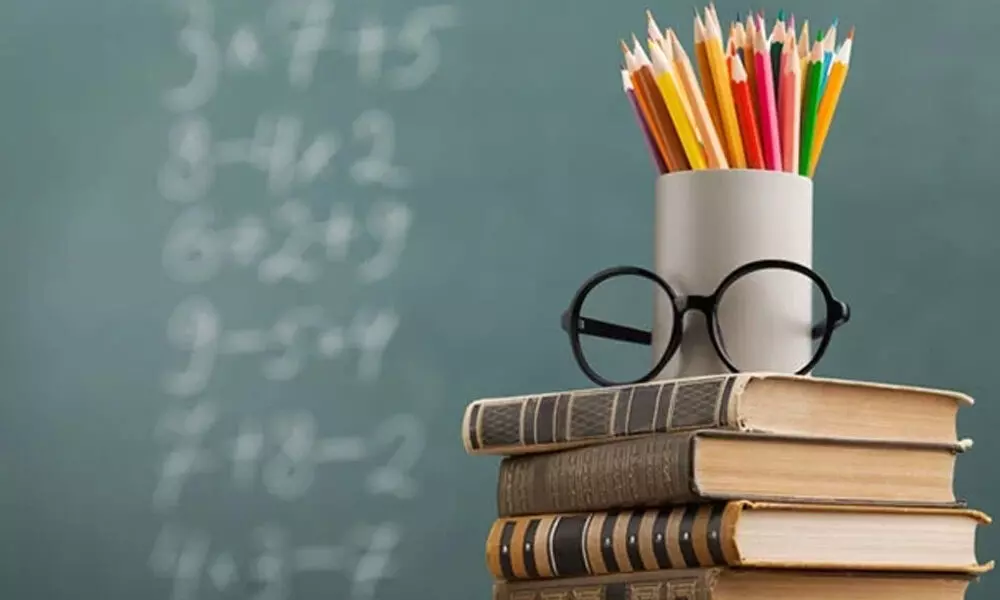Live
- Advocates Protest Misleading Land Allocation for Jogulamba Gadwal District Court Complex
- Good Swimmer, Lifejacket On’: Brother of Missing Man Holds Hope After Mumbai Boat Accident
- TTD Invites Proposals for 'Tirumala Vision-2047' Development Plan
- Champions Trophy 2025 Venue Revealed: India, BCCI Face Setback After ICC 'Compromise' Decision
- Apple vs. Meta: Privacy vs. Interoperability Under the EU’s Digital Markets Act
- District Collector Urges Swift Completion of Pending Construction Projects
- KTR Faces Case Over Rs 45-Crore Payment for Formula E Race in Hyderabad
- HYDRAA Demolishes Illegal Shops in Manikonda’s Alkapur Colony Amid Protests
- Why Dates Are a Winter Superfood: Top Health Benefits of Khajoor
- District Judge Ganta Kavitha Devi Conducts Surprise Inspection at Gadwal Government School
Just In
Education - Paving way for a better tomorrow


Education - Paving way for a better tomorrow
“The great aim of education is not knowledge, but action ”-Herbert Spencer
An independent education system would comprise of those schools that can design their own curriculum and assessments and do not come under the purview of direct government regulations. Such institutions would offer choice based curriculum that covers a vast range of learning areas suited to 21st century learning requirements; the pedagogy would have a variety of teaching tools and techniques that does justice to the curriculum. These independent institutions need not necessarily be for profit though.
Before we envision an independent education system, let us pause and think about where the education system is right now. There is a lot of buzz about changes to the present system, with NEP around the corner. In that context, let us first process the rudimentary causes as to why there is a desperate need for change.
Curriculum: India has been following the same pattern of education since independence. Does our current curriculum cater to the present needs of the society, country, world and of course! Employment sector. No! Subjects like history and geography need to be taught by making connections to the present. Otherwise, students do not understand the relevance of learning about the past.
Math needs to show us how scientific discoveries & inventions and commercial trade and commerce necessitated conceptualization of new Math concepts. Science subjects ought to make us wonder "How was this discovered/invented? Can I do the same?" Curriculum also needs to be linked to the interests of the students and the skills needed for 21st century jobs. We never knew that aspiring to become a doctor would mean spending a good number of years writing exams on subjects that weren't related to "medicine", and spending another five years in order to become a doctor. How about giving students (middle school onwards) a choice of subjects from which to choose? Students can pick those subjects that excite them and those that will contribute to their career ahead.
Apart from content knowledge, the skills that will help one succeed in 21st century jobs are creative thinking, problem solving and quick decision making. Does the education system focus on these skills?
Assessments, marks and grades: Right now, the education in India is highly "marks" oriented. Sure, we started off as kids who were taught that learning is fun and ought to be driven by curiosity. But with periodic exams & tests and emphasis on "marks", soon enough, the only reason a student studies anymore is to get good grades. There is a constant pressure to perform, leading to stress, mental health problems and anxiety. Exams were meant to be a means to suggest where the student stands and where he / she needs to go, but scores and marks soon became an end in themselves. Moreover, half of these tests/exams test memory rather than actual understanding. This results in students developing a disinterest towards learning.
A child's full potential can never be unlocked if the curriculum and assessments are not tapping into the same. In the same context, I do not see the purpose behind Board exams and personally, I think they could be replaced with alternate assessment mechanisms. If a student seeks admission to a higher educational institution, entrance exams and personality tests could be sufficient criteria.
Amidst all this, NEP is a ray of hope inching towards these changes.
While the above are long term policy changes that are undoubtedly needed, the current pandemic situation has surely rattled the way education is imparted. Technology enabled online learning is the new trend, necessitated by the need for social distancing. This online mode of learning has gone down really well with me. I have always wanted to try homeschooling. Now that I've got a taste, well a spoonful really, (It's been more than a year!) it's something that I'm enjoying. The E- mode of learning seems to be here to stay post the pandemic as well. As much as students enjoy writing down pages of notes, and teachers, the smell of chalk, this extended period of online schooling paves the way for technology-enabled learning.
In all, there are many perspectives to the system of education in India. It's a developing system; the government, education administrative agencies and institutions have all been accommodating the basic changes for coping up with the dynamic 21st century environment, but I hope we soon see drastic changes for the better.
(The writer is a student of Grade 10 of Ekya School, J P Nagar)

© 2024 Hyderabad Media House Limited/The Hans India. All rights reserved. Powered by hocalwire.com






